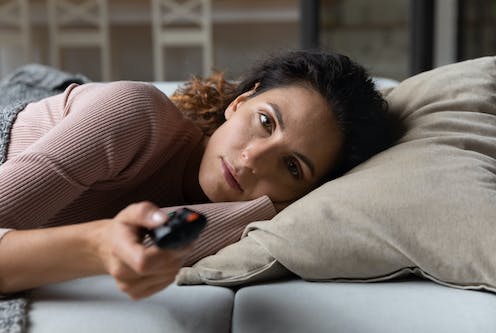
It’s often thought that if someone is depressed, they will feel sad or low most of the time. But what many don’t realise is that these aren’t the only symptoms of depression. Another common symptom of depression that is sometimes overlooked is the feeling that you no longer find the things you used to enjoy to be interesting or pleasurable.
Known as anhedonia, this symptom is present in up to 75% of adults and young people with depression. But despite how common this symptom is, it remains one of the most difficult symptoms to treat and manage.
Loss of pleasure
Anhedonia is defined as the reduced interest or pleasure in all – or almost all – activities a person previously enjoyed. If a person has anhedonia for an extended period of time (at least two weeks consistently), they can be diagnosed with depression – even if they may not feel sad or low.
Although mainly associated with depression, anhedonia can also be a symptom of other disorders – such as schizophrenia, anxiety and Parkinson’s disease.
In in-depth interviews my colleagues and I conducted with young people about depression, anhedonia was described by many as not just a loss of joy, but also less motivation to do things. For some, this lack of drive was only related to specific things – such as going to school or seeing friends. But for others, it was more severe, and they felt they didn’t want to do anything at all – not even live.
But despite how troubling anhedonia can be, it’s often not the main target of depression treatment.
It’s recommended that cases of mild depression are treated with talking therapy. People with more moderate or severe cases of depression may be prescribed antidepressants. While all these treatments aim to help patients cope with and overcome symptoms, over half of people with depression don’t respond to their first recommended treatment. Even after changing treatments, approximately 30% of patients still experience symptoms.
It’s been argued that one reason for these low response rates may be because current treatment techniques don’t adequately target anhedonia. Research also shows that having anhedonia predicts chronic relapsing of depression. It’s even possible that some antidepressant treatments might make anhedonia worse.
Why might this be? One possibility is that current standard treatments focus mainly on treating the depressed mood and brain processes that underpin low mood – but not anhedonia. For example the main aim of talking therapies, such as cognitive behavioural therapy, is to reduce negative thinking in patients. The most common antidepressant medications also mainly target serotonin, which is thought to underpin in part, how the brain processes negative information.

Ponomarenko Anastasia/ Shutterstock
But as anhedonia is reduced joy in life, treatments such as behavioural activation (a form of talking therapy) could be better for anhedonia. This is because behavioural activation aims to help people with depression take simple, practical steps towards enjoying life again. Yet some studies find behavioural activation is no better than standard treatments in managing anhedonia. This might be because the very nature of anhedonia includes a lack of motivation – making it difficult for patients to engage in any therapy, even forms which may most benefit them.
Anhedonia has also been linked to dysfunctional reward mechanisms in the brain. As such, treatments which focus more on improving the way the brain processes reward could help alleviate anhedonia more effectively than current treatments.
But the brain’s reward system isn’t straightforward, and actually involves various subprocesses – including anticipation, motivation, pleasure and learning about reward. Problems with any one of these subprocesses could be contributing to anhedonia. As such, it will be important for research to uncover how these subprocesses operate in people with anhedonia to develop better targets for treatment.
Treatment options
While anhedonia may be complex, that doesn’t mean there’s no hope for those who are affected by it.
For instance, research shows that talking therapies which focus on reward processing could help reduce anhedonia. A recent pilot study also found that a new type of talk therapy called augmented depression therapy may work better than cognitive behavioural therapy in treating depression. This is because augmented depression therapy specifically targets anhedonia by having patients focus on both their negative and positive experiences.
Further, antidepressants that target neurotransmitters involved in the reward system (such as dopamine) might be better suited for patients with anhedonia. Early work examining drugs such as ketamine, which can affect dopamine activity, suggest it may have promise for treating anhedonia.
And while it can be hard to find motivation if you’re experiencing anhedonia, trying to find time for fun, enjoyable activities or experiences like a hobby you used to love – or even a new hobby – could help alleviate anhedonia.
Read more:
The science behind why hobbies can improve our mental health
If you think you have anhedonia – or other symptoms of depression – it’s important not to ignore your feelings so you can get the help and treatment you deserve. If you aren’t sure where to begin, you could try sharing how you feel with a loved one or with your GP.
You could also contact Samaritans – call 116 123 or email jo@samaritans.org if you need to talk to someone soon. It’s free and anonymous.
![]()
Ciara McCabe does not work for, consult, own shares in or receive funding from any company or organisation that would benefit from this article, and has disclosed no relevant affiliations beyond their academic appointment.
























